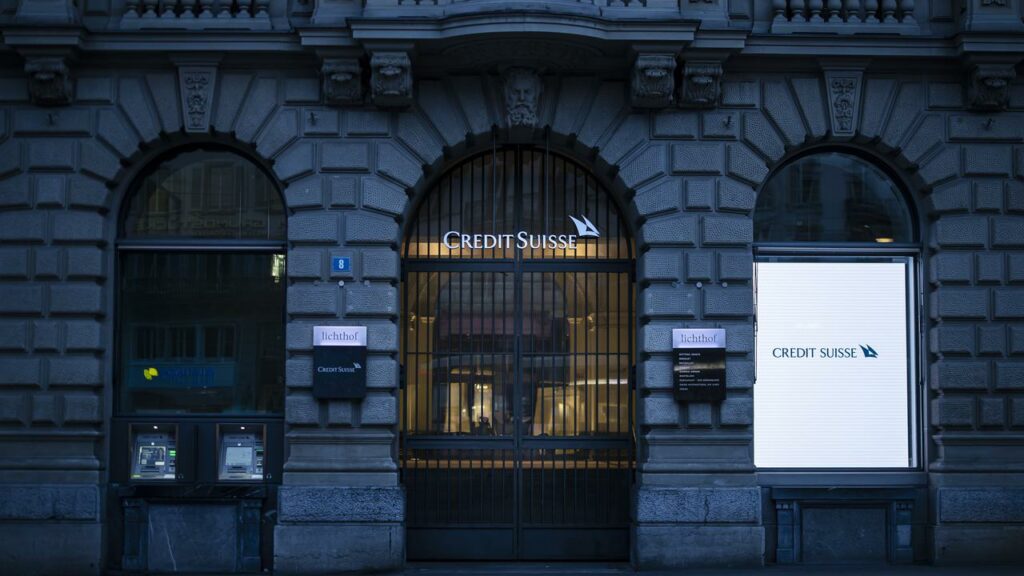UBS seals Credit Suisse takeover in bid to calm markets
Stefania Spezzati, Scott Murdoch and Tom Westbrook |

Banking stocks have tumbled as initial relief over a historic state-backed rescue of troubled lender Credit Suisse by Swiss rival UBS Group gives way to new worries about the risks of high-yield debt issued by big banks.
In a package orchestrated by Swiss regulators on Sunday, UBS Group AG will pay three billion Swiss francs ($A4.8 billion) for 167-year-old Credit Suisse Group AG and assume up to $5.4 billion ($A8 billion) in losses.
Major central banks, faced with the risk of a fast-moving loss of confidence in the financial system, also scrambled on Sunday to bolster the flow of cash around the world with a series of co-ordinated currency swaps to ensure banks have the dollars needed to operate.
While those developments appeared to shore up investor confidence in early Asian trade, the rally quickly evaporated as focus shifted to the massive hit some Credit Suisse bondholders would take under the UBS acquisition.
Under the deal, the Swiss regulator decided that Credit Suisse additional tier-one bonds – or AT1 bonds – with a notional value of $US17 billion ($A25 billion) will be valued at zero, angering some of the holders of the debt who thought they would be better protected than shareholders in the takeover deal announced on Sunday.
Worries about what that might mean for holders of AT1 bonds issued by other banks added to persistent anxiety about a range of other risks including contagion, the fragile state of US regional banks and moral hazard.
Standard Chartered Plc and HSBC shares each fell more than six per cent in Hong Kong on Monday to more than two-month lows, with HSBC facing the possibility of posting its largest one-day drop in six months.
The MSCI index for financial stocks in Asia ex-Japan was down 1.3 per cent.
“It should be clear that after more than a week into the banking panic, and two interventions organised by the authorities, this problem is not going away. Quite the contrary, it has gone global,” said Mike O’Rourke, chief market strategist, Jones Trading.
“The reports that UBS is acquiring Credit Suisse will likely magnify Credit Suisse’s problems by moving them to UBS.”
The shotgun Swiss banking marriage is backed by a massive government guarantee, helping prevent what would have been one of the largest banking collapses since the fall of Lehman Brothers in 2008.
Pressure on UBS helped seal Sunday’s deal.
“It’s a historic day in Switzerland, and a day frankly, we hoped, would not come,” UBS Chairman Colm Kelleher told analysts on a conference call.
“I would like to make it clear that while we did not initiate discussions, we believe that this transaction is financially attractive for UBS shareholders.”
UBS CEO Ralph Hamers said there were still many details to be worked through.
“I know that there must be still questions that we have not been able to answer,” he said.
“And I understand that and I even want to apologise for it.”
In a global response not seen since the height of the pandemic, the Fed said it had joined central banks in Canada, England, Japan, the EU and Switzerland in a co-ordinated action to enhance market liquidity.
The European Central Bank vowed to support euro zone banks with loans if needed, adding the Swiss rescue of Credit Suisse was “instrumental” in restoring calm.
On Monday, Credit Suisse’s banking operations appeared to be business as usual at its major offices in Asia.
Monetary authorities in Singapore and Hong Kong, where Credit Suisse hosts large regional offices, separately said the Swiss bank’s business continued without interruption.
Problems remain in the US banking sector, where bank stocks remained under pressure despite a move by several large banks to deposit $US30 billion ($A45 billion) into First Republic Bank, an institution rocked by the failures of Silicon Valley and Signature Bank.
On Sunday, First Republic saw its credit ratings downgraded deeper into junk status by S&P Global, which said the deposit infusion might not solve its liquidity problems.
Reuters


